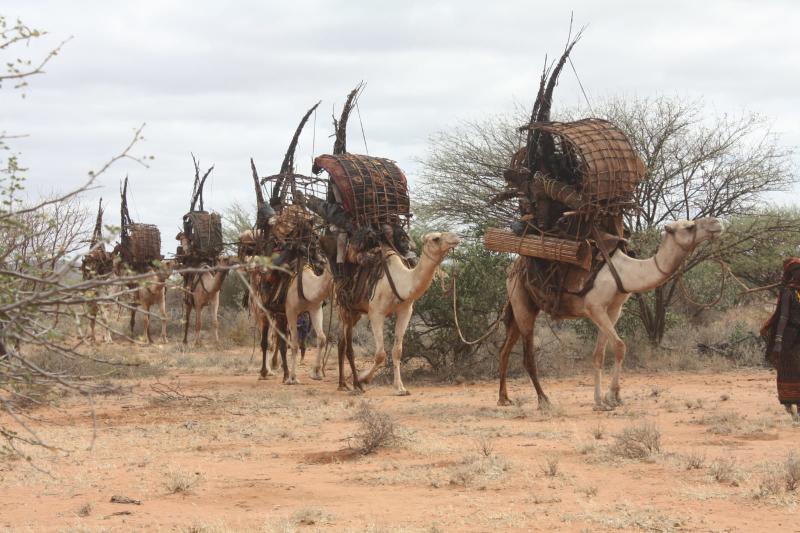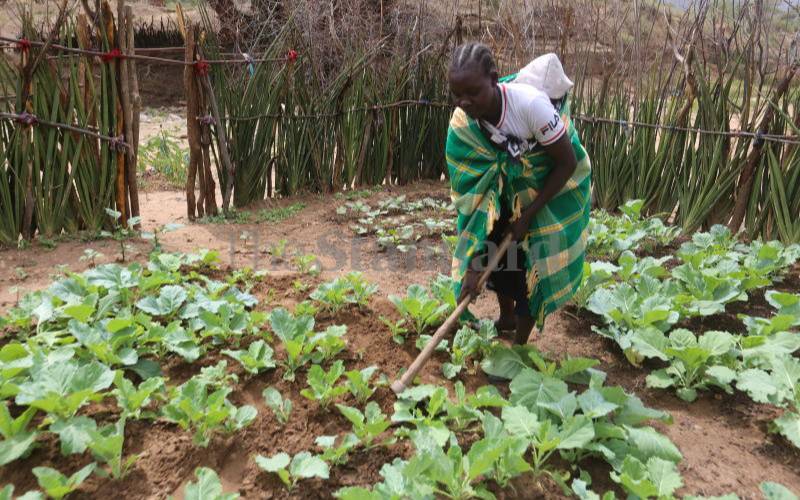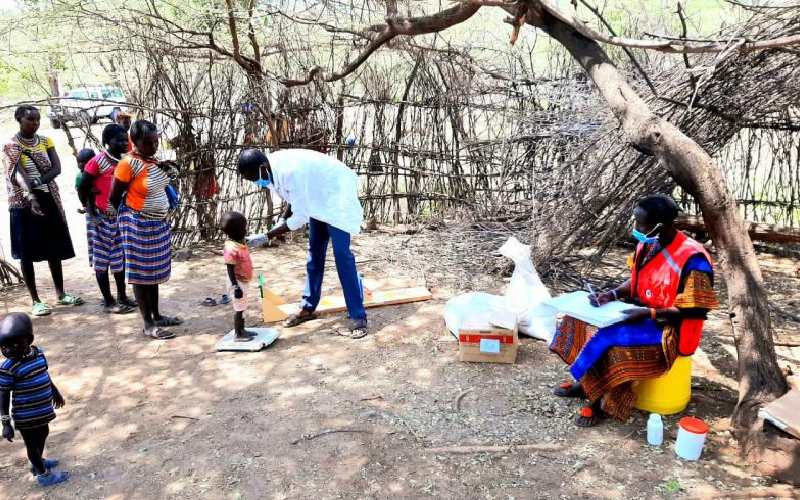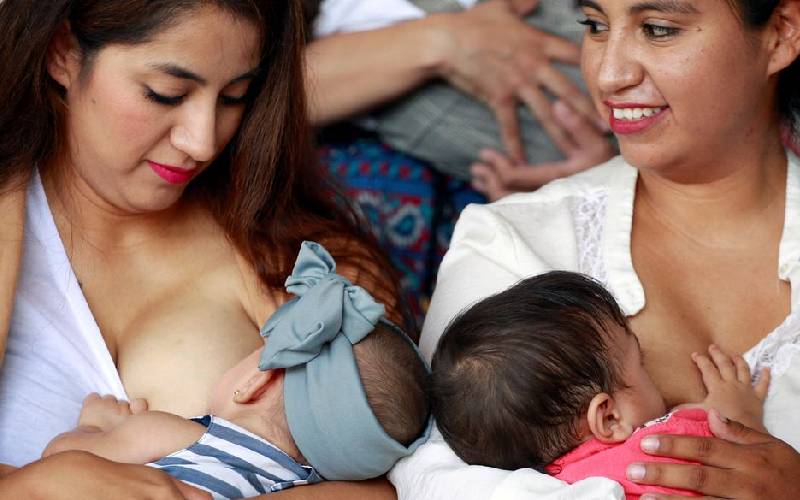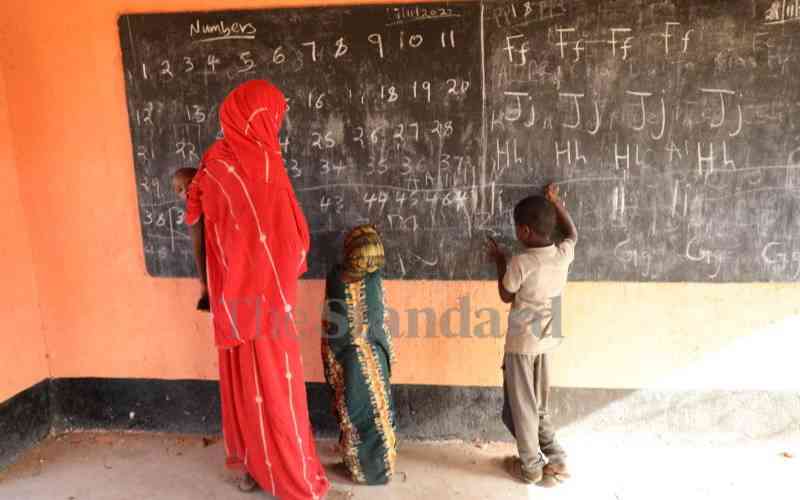
It is a Tuesday morning but the classroom is locked with a padlock.
Young boys herding livestock stop by and take shelter from the scorching as they play with marbles on the verandah.
An elderly man clothed in a 'shuka' comes by and unlocks the door to one of the classrooms.
Excited, the boys dash in, as they mimic teachers and learners. Their playful nature rekindles learning at the school, which has greatly been disrupted by the adverse effects of climate change.
This is Bula Mobile Nursery and Primary school. The school has a capacity of about 50 pupils in Pre-Primary 1 and 2 and Grade 1.
The date scribbled in chalk on the board is November 11, 2022, there are other writings indicating a possible English lesson on that date. It is clear that there hasn't been learning at the school since even though schools closed some 10 days later and opened for the year on January 23, according to the government calendar.
"This school was opened last year but learning stopped," says Aden Double Abdulahi, chairman of the school management board.
Here, learning is a luxury, as the community grapples with food insecurity caused by the prolonged drought.
- Young environmentalist working with schools to conserve environment
- Ministries join forces with millers in food fortification programme
- Sex education key for HIV prevention among teenagers, experts say
- Parents, educators urged to encourage play to boost learning
Keep Reading
School-going children are forced to accompany their parents in search of food, water and pasture for their stock.
"It is our desire to have our children get an education, but it is no longer a priority. Children cannot report at school as they are starving," says Abdulahi.
"Families are going for days without food. They walk hundreds of kilometres in search of water for survival."
The drought situation is dire. Hundreds of livestock, which is the main source of income for the locals, have died, while the few remaining are not productive.
Hundreds of carcasses lie in the bare grazing field, with some burning in the thicket and along the road.
Previously, locals used to sell their livestock to buy food and pay for their children's education. There was also a school feeding programme that kept their children fed. Now that schools are closed, the children can only eat what is available at home -- and there is little.
"We had two volunteer teachers whom we paid Sh10,000 monthly, but they have been forced to flee in search of food and survival because we cannot keep them," regrets Abdulahi.
Abdulahi's camels, goats, and cows have been swept by the drought.
"This is the worst drought I have ever witnessed. It has killed my 500 goats, 1 camel and 50 cows," he narrates.
Abdulahi, migrated to Garissa from Meru 10 years ago, to secure pasture and water for his livestock.
"I was forced out of my original home in Meru because of drought. I am pained because the drought, which I ran away from, has killed all my sources of income," says the pastoralist.
Out of his 14 children, only one goes to school.
"I am not comfortable having my children walk a long distance to school on an empty stomach as they are too weak," says the father.
Starvation, according to the local, is likely to cause deaths. "Our daily prayer is to have rains, as we risk death due to starvation"
Dhahabu Adan, a parent at the school, can also not afford to pay school fees for her six children.
She has two children in Grade 1 and Grade 2.
"I am forced to stay with my children at home after the death of all my livestock," narrates the mother, adding, "I am hoping that, someday, it will rain and have use afford food for ourselves and our few remaining livestock".
Learning has not only been disrupted at Bula Mobile primary, but nearly all public schools in the county are reporting high rate of absenteeism of both learners and teachers.
Last year, the long rains assessment report by the National Disaster Management Authority of October to December 2022 projection period for the Arid and Semi-Arid Land (ASAL) region estimated that 1.6 million children were at a high risk of dropping out of school as schools reopened for the first term this year. The worst-hit counties according to the report, were to include Mandera, Garissa, Wajir, Turkana and Marsabit.
In the report, Mandera was projected to have the highest number of school dropouts of 295,470 children aged between four and seventeen years old, followed by Garissa follows with 289,410, Wajir at 266,540, and 253,640 cases in Turkana at 253,640 and 107,600 recorded in Marsabit.
Other counties which were greatly affected by school dropouts are Narok with 83,020, West Pokot with 80,070, and Samburu with 64,818 school dropouts.
The situation is a bit better at Hirbaya Primary school where 92 pupils out of 280 have reported to school.
During a visit at the school by The Standard team, there was no Grade 6 pupil and there were only seven Standard Eight learners out of expected 13, whereas Grade four, and five had four and five pupils respectively.
The highest enrolment was at PP1 and PP2 at 15 and 26 respectively.
The school head teacher Sam Odundo attributes the absenteeism of pupils to drought that has greatly caused food shortage at the family level.
Mr Odundo said there is also an acute shortage of water in the community.
"Pupils follow their parents to where they can get water.
There is nothing much we can do as management to have them report to school because we also do not have supply," says Odundo.
The school depends on well-wishers for supply of water, and food, after the stock supplied by the government depleted.
"The Majority of pupils report to school when there is a feeding program. But currently, because of lack of water and food, they are out of school," adds the teacher.
The drought has not only affected learning, but teachers employed by the school management board have also not been paid.
The school has two teachers posted by the Teachers Service Commission (TSC), and one employed by the board, who hasn't received his six months' salary.
"Teachers hide their grievances to give hope to pupils, but they are struggling following the hard-hit drought. We are just hoping for a better tomorrow," Odundo remains optimistic.
Due to the drought, the school doesn't have a female teacher, despite them being key in shaping the character and traits of a girl child.
The school management is therefore forced to contract a female patent to offer to guide and counsel the learners.
"Girls are easily counseled by a female teacher, but we have none, and because of reserved culture among the community, we bring on board parents to provide the service," he says.
Guiding and counselling according to the teacher is key in shaping character and improving performance among learners.
Yusuf Gedi, program manager Save the Children Garissa office adds that the ongoing drought has disrupted normal livelihoods.
Mr Gedi says the most affected schools are those in Balambala and Lagdera Sub-Counties.
Learning has been suspended in most of the schools in the sub-counties because of a lack of water.
School feeding program has also been halted in schools.
"School-going children are spending days and weeks in search of water and food, a crisis that is greatly biting education," says Gedi.
A number of learners, more so boys, have also been forced into child labour, to help their parents raise income, whereas girls are being forced into early marriages, according to the official.
"Some families marry off their girls to sustain their families," observes Mr Gedi.
He adds, "Learners have low concentration in class, while the majority miss out on lessons due to food insecurity caused by the drought".
The drought has also swept hundreds of cattle, leaving families in abject poverty
As mitigation, Save the Children in partnership with other organisations supply water to schools, and provide a school feeding programme.
"Fighting hunger is the only way to keep children in school. We are pleading with the government and more donors to donate food, and help supply water in schools," Gedi pleaded.
The drought situation is projected to further worsen during the long rains season owing to the forecasted below-normal rains further exacerbating drought conditions with the population facing acute food insecurity hitting 5.4 million, by June 2023.
 The Standard Group Plc is a multi-media organization with investments in media platforms spanning newspaper print
operations, television, radio broadcasting, digital and online services. The Standard Group is recognized as a
leading multi-media house in Kenya with a key influence in matters of national and international interest.
The Standard Group Plc is a multi-media organization with investments in media platforms spanning newspaper print
operations, television, radio broadcasting, digital and online services. The Standard Group is recognized as a
leading multi-media house in Kenya with a key influence in matters of national and international interest.



